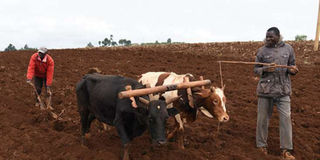Proposed agriculture laws will create jobs

Farmers plough their land in preparation for the coming planting season in Mt Elgon. PHOTO | FILE | NATION MEDIA GROUP
What you need to know:
- Agriculture constitutes a critical component of Kenya’s economy, employing approximately 70 percent of the country’s workforce.
- The proposed Dairy Industry Licensing Regulations of 2018 have received their fair share of criticism from all quarters, including politicians.
The 2030 Agenda for Sustainable Development was adopted by world leaders in a historic UN summit in September 2015 and came into force on January 1, 2016.
Of the 17 strategic development goals in this agenda, special attention needs to be given to goal number 8, which seeks to promote inclusive and sustainable economic growth, employment and decent work for all.
Agriculture constitutes a critical component of Kenya’s economy, employing approximately 70 percent of the country’s workforce at various levels of the value chain.
PRODUCTION
The sector also contributes approximately 30 percent to our GDP. Employment opportunities at the production node of the value chain constitute mainly of wage labour, which is often informal, seasonal, task-based and with no formal labour contracts that would come with social benefits such as health and social security.
These forms of labour are therefore precarious as a result of the multiple decent work deficits. As a result, these opportunities are unattractive, especially to the youth, thereby threatening sustainable agricultural production.
Multiple production and price risks and high transaction costs facing producers aggravate the situation such that attempts to improve the work environment for employees are often seen as an extra financial burden on the enterprise.
GLOBAL TREND
The current global trend in trade in agricultural commodities is characterised by a raft of technical barriers in the form of standards that demand adoption of good agricultural practices and also labour conditions at production that are devoid of slavery, child labour and other forms of decent work deficits.
To participate in international markets, Kenyan farmers must start seeing statutory regulations in the light of improving their chances for participating in export markets. Rather than looking at the glass as half-empty, we need to see it as half-full.
A case in point is the big ongoing debate on the food crops bill. Overall, this law intends to promote quality assurance and traceability of our agricultural produce. By regulating trade, the law will organise markets, thereby reducing transaction costs and risks borne by producers.
The proposed Dairy Industry Licensing Regulations of 2018 have received their fair share of criticism from all quarters, including the political class.
CONSUMERS
World over, the Kenyan milk market is unique in that 70 percent of the milk is sold raw to consumers.
This can be blamed on the fact that milk has traditionally been a major component of the diet in most of our communities.
We are, however, currently faced with very serious human health issues, including antibiotic residues and high mycotoxin levels in milk.
These quality issues are to a large extent beyond the control of most dairy producers.
EMPLOYMENT
The proposed regulations, just like the crops bill, intend to address such shortcomings and improve traceability of milk.
Though such laws have been seen as “over-regulating” the sectors, they will definitely contribute towards creating decent employment opportunities that are sustainable through organising production and marketing, improving demand and reducing informality in agricultural labour.
Dr Muthui is a veterinary surgeon and doctoral fellow of the International Centre for Development and Decent Work, AnSc, Egerton University, Njoro; [email protected]




